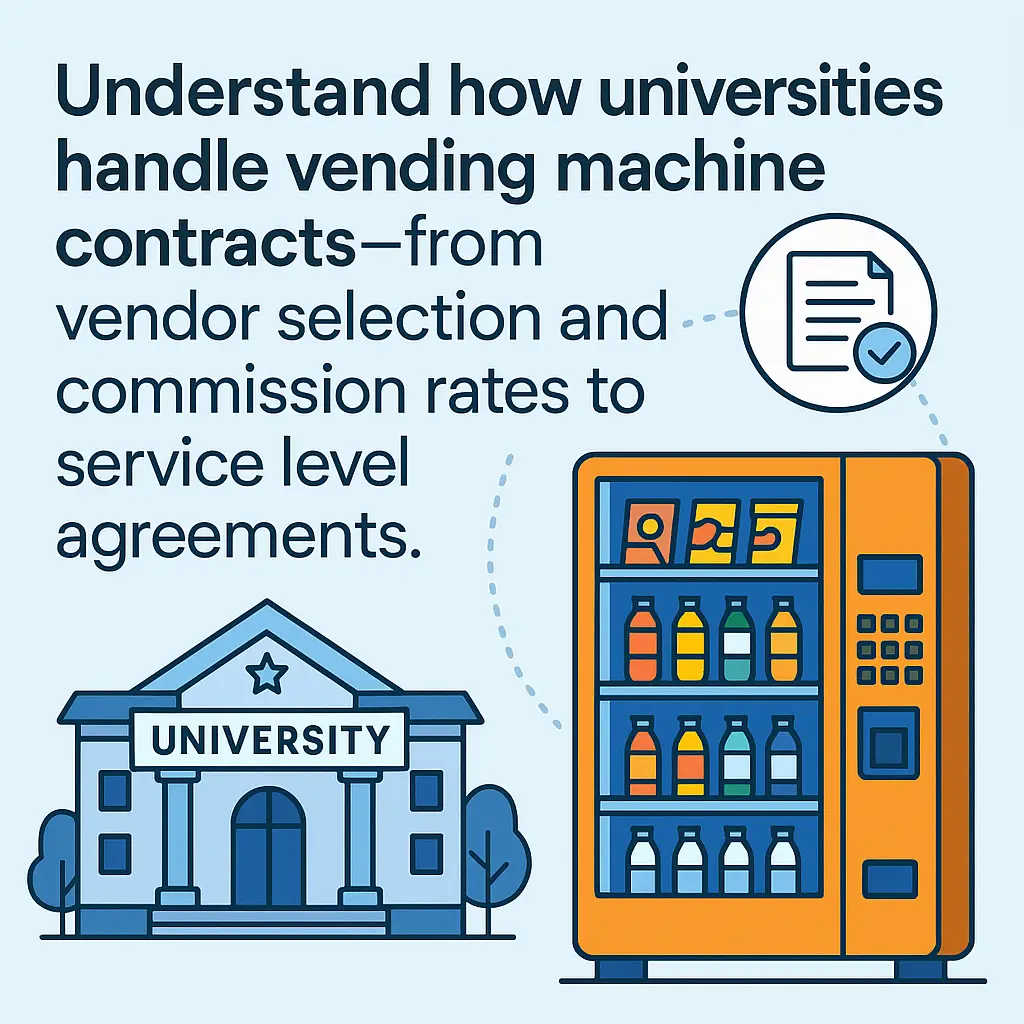Managing Vending Contracts for University Campuses
Understand how universities handle vending machine contracts—from vendor selection and commission rates to service level agreements.
Back to Vending for Colleges ResourcesUnderstand how universities handle vending machine contracts—from vendor selection and commission rates to service level agreements.
Back to Vending for Colleges ResourcesUniversities should evaluate commission rates, service response times, healthy product availability, and contract flexibility before signing an agreement.
![]() Commission rates vary by campus size and sales volume
Commission rates vary by campus size and sales volume
![]() Clear SLAs improve machine reliability and service quality
Clear SLAs improve machine reliability and service quality
![]() Healthy vending requirements are common in modern contracts
Healthy vending requirements are common in modern contracts

Universities rely on vending machines to provide students, staff, and visitors with convenient access to snacks, drinks, and other essential items. When entering into a vending contract, administrators must balance financial returns, service quality, and student satisfaction. A well-structured agreement ensures reliable access, fair revenue sharing, and long-term value for the institution.
One of the most discussed aspects of university vending contracts is commission structure. Campuses often receive a percentage of sales revenue, which can help fund student programs or facility improvements. Commission rates typically vary depending on campus size, sales potential, and the number of machines installed. To avoid future disputes, universities should ensure commission terms are transparent and outlined clearly in the contract. For more insight on vending profitability, see how student organizations use vending for fundraising.
Another critical element is the service level agreement. SLAs define expectations for machine uptime, repair response times, and product freshness. Without clear service standards, schools risk frequent outages, stale products, or slow maintenance response. By requiring detailed SLAs, universities can hold partners accountable and guarantee consistent service. Learn more about operational standards in this case study on vending performance.
Vending contracts can range from short-term pilots to multi-year commitments. While longer agreements may secure higher commissions, they also reduce flexibility. Universities should weigh the benefits of stability against the ability to adapt to changing student preferences or new technology. Shorter contracts allow campuses to adjust to trends such as healthier product mixes and cashless vending options. For insights on payment trends, explore cashless vending adoption on campuses.
Modern contracts increasingly include guidelines for product selection. Many universities prioritize healthier items, including low-sugar beverages, protein snacks, and fresh food options. This approach not only improves student satisfaction but also aligns with campus wellness initiatives. Administrators should ensure these requirements are explicitly included in contracts to avoid limited product choices. To understand evolving vending models, review examples of vending tailored to student needs.
If you're exploring vending options for your business, Vending Exchange can help simplify the process. Delivery, Installation and Equipment is provided at no cost to you - vendors provide the machines, keep them stocked, and handle all servicing. Whether you need a provider or full-service management, just fill out the form on this page to get started.
Rates are typically negotiated based on sales projections, machine volume, and campus priorities.
SLAs should define repair response times, product freshness standards, and machine uptime requirements.
They range from short-term one-year pilots to five-year or longer agreements.
Yes, many campuses include guidelines to ensure healthier snack and drink options are available.
Universities can enforce penalties, request credits, or terminate contracts for repeated violations.
Yes, some agreements direct a portion of commissions to student organizations or activities.
This depends on the agreement, but some contracts allow renegotiation under specific conditions.
They include product mix requirements in the agreement, often mandating both traditional and healthy choices.
Yes, many contracts specify that machines must support debit, credit, and mobile payment systems.
Usually, a facilities or auxiliary services department oversees compliance and manages communication with vendors.